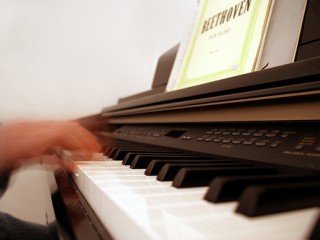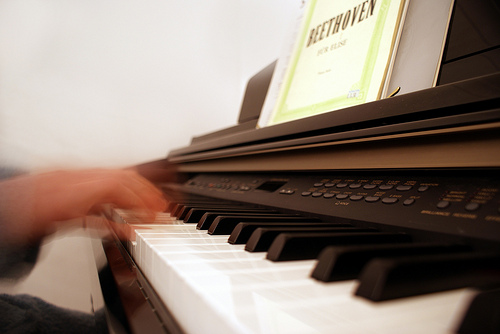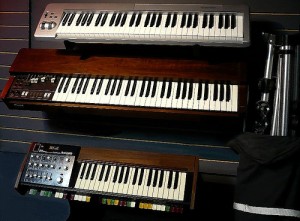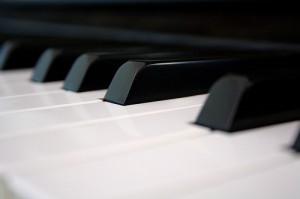
 Over the years, many parents and students have asked me this question: Which is better and more practical for practicing piano, a digital piano or an acoustic piano? What are the pros and cons of playing digital piano vs acoustic piano? Some would phrase it like this: should we own a digital keyboard…or a real piano?
Over the years, many parents and students have asked me this question: Which is better and more practical for practicing piano, a digital piano or an acoustic piano? What are the pros and cons of playing digital piano vs acoustic piano? Some would phrase it like this: should we own a digital keyboard…or a real piano?
My answer should come as no surprise: It depends entirely on your purpose.
Digital Keyboards: A Brief History
The fact is, digital and electronic keyboards have come a long way. When they first came out, they had limited application. Some were more like toys, others were designed to have specific applications (like a clavinet or Moog synthesizer). When I was in junior high and high school, I played on a portable electric organ in several rock bands and the sounds (all 4 of them) were abysmal. But, as I couldn’t afford a Hammond B-3 (with Leslie speakers), I had to make do. Thank goodness my parents had provided a good acoustic piano which I used for most of my serious piano practice.
These days, however, there is a huge variety of all kinds of electronic keyboards, many of which are extremely versatile and which afford thousands of great sounds and functions. Many of them come with (or you can program) great sounds that are very realistic simulations (or samples) of existing instruments as well as sounds that simulate the cheap little organ I used in high school. And there is no end to all kinds of combinations possible.

Today’s digital keyboards afford an endless variety of sounds and functions. (image source: http://photopin.com/)
How Do You Intend To Use Your Keyboard?
If your main goal is to learn traditional skills and repertoire, my recommendation is that you use an acoustic piano. Most of the art literature was written for and performed on acoustic piano. The way the keys are shaped and weighted and the way your fingers touch the keys and produce the expressions that go into what makes art music so beautiful often is compromised when playing a digital keyboard. Many digital keyboards have fewer keys than a “real” piano, and the keys are weighted and shaped differently (often more like keys on an organ). Even ones that have the same weight and size as a real piano, however, often
For those who wish to play both classical and contemporary, my recommendation is that you own both kinds of keyboards, if possible.
do not have quite the same feel. If you were to prepare for a serious recital or competition on one of these keyboards, you would be in trouble.
On the other hand, if you have no intention of being a classical or jazz performer, and, especially, if you want to dabble in recording, sequencing, or if you play in a pop, rock, or an otherwise contemporary setting, you likely will prefer a digital keyboard…as it affords greater flexibility. Having a keyboard that is portable is, of course, a major requirement if you intend to play local gigs at various venues that don’t already have a keyboard on site.
For those who wish to play both classical and contemporary, my recommendation is that you own both kinds of keyboards, if possible. Do most of your basic finger drills and repertoire practice on the acoustic, and practice your sound-making and ensemble work on the digital keys.
What About Cost?
In general, digital keyboards are more affordable than real pianos. But this, too, is not absolute. You can sometimes find a fairly affordable used acoustic piano that is in relatively good shape. And electronic keyboards can range from very cheap (and poor quality) to very expensive. Usually, the shorter and smaller the keyboard, the less expensive it is. Digital keyboards with keys that are weighted, shaped and arranged like those on a real piano are usually much more expensive than the ones with smaller keys that feel more like an organ.
So you have to weigh the cost against what you want. If you prefer one kind of keyboard but can only afford another, I say go ahead and get what you can. At least you’ll be able to practice, regardless. Even though I prefer students to practice on a real piano, I believe it’s fine to use a less expensive digital keyboard, especially when the student is first starting out and you’re not sure if you will be sticking with lessons for a long time.

Traditional repertoire and skills are best learned on an acoustic piano. (image source: http://photopin.com/)
Conclusion
For learning traditional skills and repertoire, I recommend acoustic. For experimenting and performing in various contemporary and digital environments, I recommend digital. So it all depends on your purpose…and only you can decide that.
 Follow
Follow